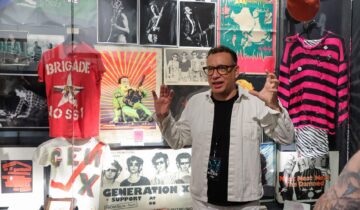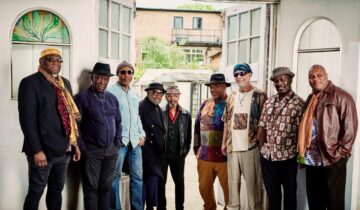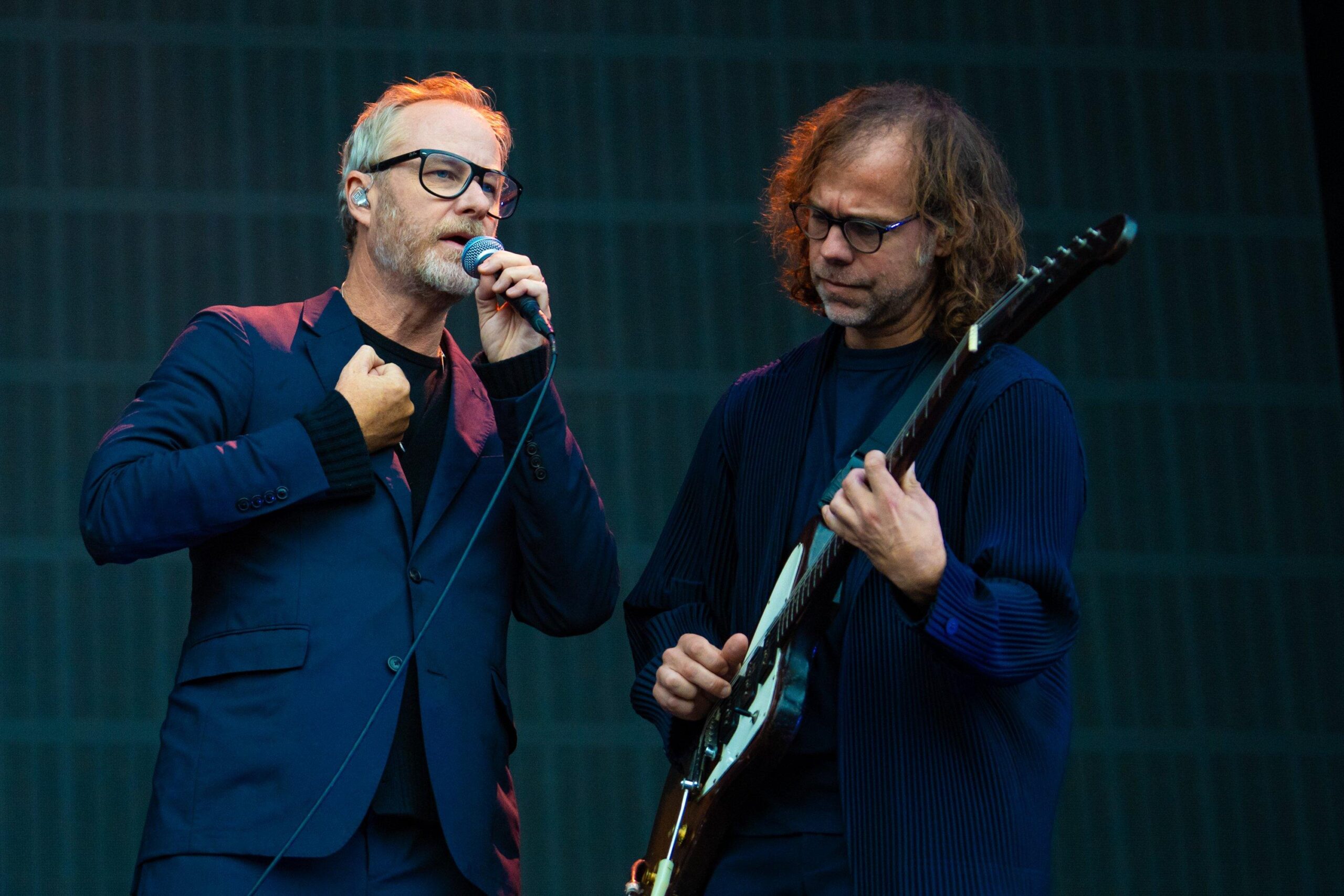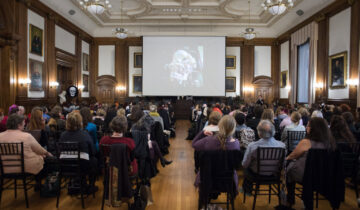Pianist and Composer AyseDeniz was always a fan of classical music. With the help of artificial intelligence, the musician was able to “interact” with composers like Frédéric Chopin; she shares her thoughts on AI applications in music.
Story for GRAMMY.com Oct 1, 2024
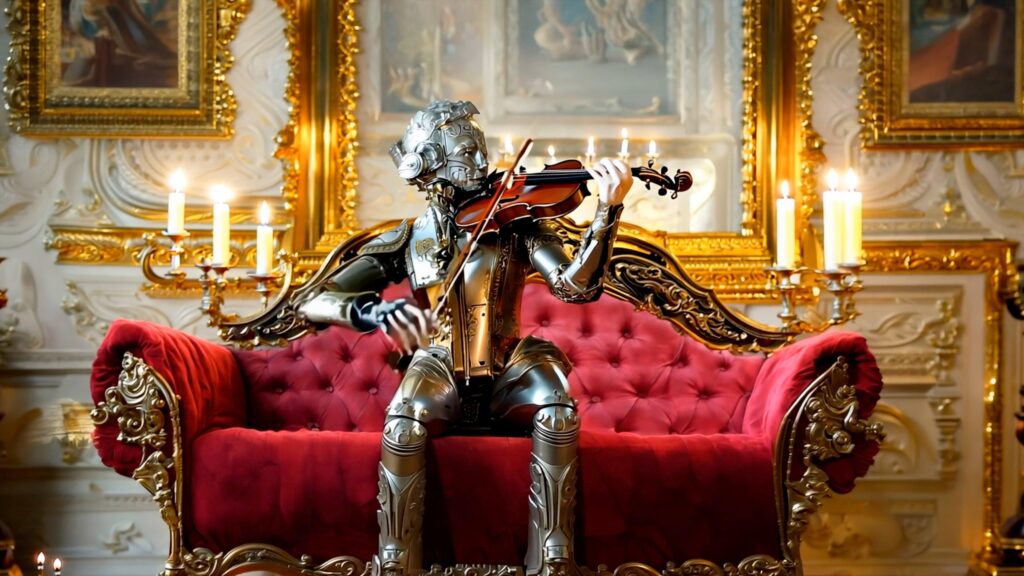
In May, the globally-renowned pianist and composer AyseDeniz Gokcin conducted an experiment in Los Angeles.
In front of a room full of people at the conference CogX, AyseDeniz sat at a piano and played three short excerpts of music. The first piece was by legendary Polish composer Frédéric Chopin, the second was an original composition in the style of Chopin, and the third was music she generated using AI to sound like Chopin. AyseDeniz then asked the room to guess which one was real. While a few of the conference attendees guessed correctly, the vast majority did not.
One of AyseDeniz’s favorite composers, Chopin was renowned for merging elements of Italian opera with Polish music; the sound captivated AyseDeniz at a young age. Like AyseDeniz, Chopin was a child prodigy who was equally passionate about performing and educating. Her goal at CogX — a conference that explores how artificial intelligence and other emerging technology impacts society — was to use AI to get people excited about Chopin and classical piano music in general.
“I want people to see how one piece of music can be stylistically different from another, and understand what makes someone like Chopin original,” AyseDeniz tells GRAMMY.com. The artist adds that, through analytical listening, people can ascertain whether something is “on brand, or if it’s off.”
And while AyseDeniz didn’t originally plan on using AI to encourage interest in classical music, “I always wanted a way to bring back dead composers somehow.”
She took that goal even further by feeding articles about Chopin and other text into a program designed by AI music generator platform Udio. The result was a virtual Chopin who can verbally respond to questions in real time. During a private concert dedicated to Chopin, AyseDeniz’s virtual Chopin spoke about his music and life during a panel discussion.
“It was intense and a little scary,” AyseDeniz says. “People sent me messages afterward that they were having an existential crisis.”
Her presentation is called “Classical Regenerated,” a show that presents AI-generated compositions alongside original works from the masters. AyseDeniz also interacts with AI agents of composers she’s trained, allowing them to answer questions from the audience. As with her CogX lecture, “Classical Regenerated” is designed as both a tribute to her favorite composers and a way to get people excited about classical music.
AyseDeniz isn’t alone in her explorations of technology and classical compositions. The classical music world — and music industry at large — is grappling with AI in many ways. At MIT’s Opera of the Future group, composer and professor Tod Machover uses AI to crowdsource sounds from residents of various cities to create “City Symphonies” and also helped create an experimental radio station that plays songs generated by AI.
Earlier this year at Symphony San Jose, cellist Yves Dhar “battled” a hologram version of himself playing a piece called “Automation” by composer Adam Schoenberg. The hologram was constructed ahead of the performance using an AI model that had been trained with Schoenberg’s entire body of work.
AysheDeniz — pronounced EYE-SHA deh-NEESE — wasn’t always interested in technology. She grew up in the Turkish capital of Ankara, where her mother frequently took her to hear live music. Her parents had a large collection of classical piano CDs at home, but her father also loved the Everly Brothers, Cat Stevens, the Beatles, Pink Floyd, and musicals like “Cats.” She remembers dancing to Elvis Presley with her dad as a young child.
She began playing piano around age 5 and performed her first solo show — Bach’s Keyboard Concerto No. 5 — with an orchestra at 9 years old. She took piano seriously and was very disciplined; when she woke up every morning, she went straight to the piano. She would hear a piece and then practice it for four hours a day.
AysheDeniz’s piano journey wasn’t easy: she obsessed over mistakes and suffered from stage fright. She was strict with herself and didn’t want piano to be fun. Someone once asked her to play the Star Wars theme and she refused. At 7, she was in the same class as 14 year olds, and soon had to join classes with adults.
In her teens, she started to relax and have more fun: she listened to the Red Hot Chili Peppers, Metallica, System Of A Down, and the Turkish rock band Athena. She dyed her hair pink and would listen to Eminem before she played Beethoven. But her commitment to the piano was steadfast: AyseDeniz went on to study at the Eastman School and the Royal Academy of Music.
She’s gone on to perform in more than two dozen countries, has more than 600K fans online, is a GRAMMY voting member, was listed by Encyclopaedia Britannica, alongside Adele, Lil Nas X, and Lorde, as one of the 20 under 40 Young Shapers of the Future of Music.
But something changed in 2009 when AyseDeniz began pursuing her master’s degree. She was shocked when she first learned that people could buy orchestra sounds from sample libraries, or craft a score using a midi keyboard and layered sounds on a computer rather than hire a trained pianist. Earlier this year, she developed a specific curiosity around AI technology, and began asking questions about how it could be used with music.
This curiosity eventually led to the development of her “Classical Regenerated” presentation earlier this year, which has put her in the center of the conversation around how AI can interact with classical music.
As an “AI Music Producer,” AyseDeniz performed her interactive AI-driven shows this September at the Kennedy Center Creativity & Tech Summit, will perform in October at the TED AI conference in San Francisco — which will also feature Recording Academy CEO Harvey Mason Jr. — and at the Google campus in November.
AyseDeniz is particularly excited to present her AI tribute to Mozart, in which she plays piano with a robot AI orchestra of a piece she generated in the style of Mozart using AI, as an AI-generated Mozart in a video conducts her in real time.
“I can’t change the future or change how technology develops. Not even Taylor Swift can do that,” AyseDeniz says. “The only way is to adapt. I was like, I want to jump into this, and have humans be present in this process.”
For years, the dominant narrative was that the classical genre was a dying breed. However, recent surveys show a post-Covid uptick in orchestra subscriptions and suggest a slight uptick in the genre’s popularity. Artists like AyseDeniz and developers think that AI is one tool that can potentially help revitalize the classical music world.
Google has led projects like SingSong, which generates accompaniments for recorded vocal melodies, and MusicLM, a text-to-music generator. WavTool, a recently released AI-powered music production platform, enables users to create music via text prompts using OpenAI’s GPT-4.
Earlier this year, as the composer and vocalist Jen Wang performed Alvin Lucier’s 1971 piece “The Duke of York” at the Monk Space in Los Angeles, she sang along with a digital rendition of her voice, synthesized by artificial intelligence generated by a R.A.V.E. — a Realtime Audio Variational autoEncoder — an algorithm that compresses audio signals and extracts the sound’s features to attempt to resynthesize it.
The big question is whether AI poses a real threat to classical music, or any musical genre. In May, violinist Daniel Kurganov posted an AI-generated piece of violin music on his YouTube channel with the headline “Did AI Just Kill Classical Music?” in an attempt to answer his own questions about nuance and beauty, such as “How do we understand what good string playing is? How much of it is mystery, impossible to teach or understood in explicit terms? Can it only be emulated and passed on from one emotional being to the next?”
AyseDeniz continues to work on original piano compositions with no AI involved, but she is keen to see where new tools will lead her in her new role as an AI music producer. She hopes to add physical elements to her show, with moving keys, holograms and more AI-trained classical composers that can present shows with her in real time. Eventually, she hopes to play alongside a robot orchestra and jam with an AI pianist.
Photo by AyseDeniz
